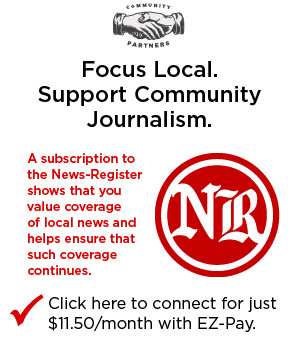Ken Dollinger: A life-long love affair with local newspapers

As a 1963 freshman at Oklahoma State University, I chose chemistry as a major, hoping to please my chemical engineer father while ignoring my unsuitability for science.
Late in the first semester, my advisor, also my English professor, informed me I was failing all my science classes, but wrote well. He advised me to change my major to communications.
It was good advice. Next semester I took a journalism class and landed a minor writing role on the university newspaper.
But by the end of the school year, I had hit the college trifecta — poor grades, poor health and no money. I left campus with no idea what to do next.
I spent the following months traveling by railroad boxcar, selling encyclopedias door-to-door, applying hot tar to commercial building rooftops, building chemical pits at an oil refinery and, finally, working at a grocery store in Texas.
One day I carried grocery bags out to the car for a lady who worked at the daily paper and turned out to be a good interviewer.
She got me to admit I was floundering. Since I had begun studying journalism and enjoyed writing, she suggested I apply to the paper for an open reporter position.
The next morning, I took my very thin resume to the newspaper office and asked to see the editor.
Now this editor, Fred, had to have been the inspiration for the TV series “Lou Grant.” He was short-tempered, mean, foul-mouthed, impatient and unforgiving.
He openly despised human beings in general. There was a rumor he had actually smiled once and didn’t like it.
His constant expression was a scowl, hovering on the edge of a snarl. Chain smoking, hard drinking and dedicated to his job, he was well into losing his fourth wife and incurring his second heart attack.
Into his lair at the back of the newsroom went the hopeful, fuzzy-cheeked 19-year-old lad with absolutely no idea of the troll he was going to face.
A pair of bloodshot eyes hovering over dark pouches and sagging jowls glared at me through a haze of smoke from multiple smoldering cigarettes in an overflowing ash tray.
Fred snapped, Fred snarled, Fred yelled. How dare I interrupt his work — at the deadline for the day’s edition, no less — with my pitiful presence.
I was told to get out of his office, his words punctuated with curses and a thrown ball of paper. And hell no, he told me, I could NOT leave my resume.
It was just the last straw, another failure topping a pile of others.
I…GOT…MAD!
The next morning, earlier than edition deadline this time, I again walked into the newspaper office and bellied up to Fred’s desk. He again snapped, snarled, yelled and ordered me out of his office.
As I left, he was dumping my resume into his overflowing trash can. And so it went, day after day, for nearly two weeks.
Then came the morning when I walked up to Fred’s desk and he snarled but did not snap or yell. He growled that if I was going to be in the office so much I might as well do some work — so he could get his work done.
I was offhandedly pointed to an empty desk sporting a manual typewriter.
One of the classified ad people dumped a pile of papers in front of me. Apparently I was now a cub reporter, assigned to writing obituaries, movie reviews, police reports and whatever else co-workers didn’t want to do.
At age 19, I was actually on the staff of a Texas daily newspaper. And I was making a whopping 25 cents an hour more than a grocery store bag boy.
Later, I discovered I would be paid for 40 hours a week, but in fact would be working more than that. Not that it mattered, though. I was a newspaperman!
And with that tiny victory in a sea of failure, my entire life pivoted.
I discovered unexpected abilities as the months passed at the city’s daily newspaper. Along the way, I came to understand I had been wrong about Fred — sort of, anyway.
With a combination of luck and determination, I moved from cub reporter to reporter/photographer covering government, police and fire, human interest, breaking news and even sports.
I conducted the final proofing of the daily pages before production. On Saturday evenings, I was responsible for sending the Sunday edition to press. And I became the one-person staff for a modest newspaper being tested by our publisher in a tiny nearby town.
As to Fred — well yes, he was a miserable human being. However, he was also a rare breed — the ultimate newspaperman, one who would bleed ink if cut.
He had a nose for news and best way to get it into print. He thrived on abuse and stress, sharing it with everyone within sight or sound. News staffers were expected to give their all to the job or regret the failure.
The best example came the morning, 30 minutes before our 11 a.m. deadline, when the AP and UPI wire machines ignited with sound and action — announcing the rapidly evolving story of a sniper firing away from the Main Building tower at the University of Texas.
Fred launched into furious action, shouting directions as he juggled page content, advertising, the back shop, paper delivery schedules and the news staff in a wholesale edition remake. It was as if he were Captain Ahab on the ship’s foredeck, exhorting his crew to bring in the white whale.
And, we did.
The presses ran with the remade edition, featuring full coverage of the latest news, barely two hours late. Readers had their papers in time for supper, and advertisers were happy.
So, yeah, Fred was a misery to work with. But he was the real deal — a genuine old-school newspaperman. And I learned a lot from him.
My successes at the newspaper gave me enough confidence to try my hand at academics again, registering in two classes at the local community college.
Across one classroom loomed a face that seemed strangely familiar, that of a cute red-haired girl.
Normally shy, I surprised myself after class to stop the girl and ask if her name was Linda. It was, and she remembered me from grade school!
The fledgling relationship had a rocky start, but I eventually won her heart. Ah, but to be honest, those early days likely had less to do with me and more to do with the romance of dating a young newspaper reporter — one with frequent story bylines and both a police scanner and CB radio in his 1956 Buick Special.
Our early dates often included other members of the newspaper staff, and she joined me Saturday evenings as the press cranked out the Sunday edition. We would stand on the driveshaft cover and imagine we felt the heartbeat of the city.
We dated, went on to West Texas State University together, became engaged and married in 1966.
I continued to work at the newspaper during school breaks and summer vacations.
At the university, I took journalism and photography classes. I joined the staff of the university newspaper, and was named editor for the 1966-67 school year.
Vietnam was heating up, and in March 1967, I enlisted in the Navy. After discharge in 1970, I returned to West Texas State and finished my journalism degree.
Newspaper jobs were scarce and candidates were plentiful. So I took corporate communication positions first with a Texas natural gas company, then with Alcoa Aluminum in Vancouver, Washington, and lastly St. Vincent hospital in Beaverton.
Eventually I got back to my journalism roots. I joined the staff of a regional magazine operating out of Forest Grove. I traveled across western states interviewing, writing and photographing rural people.
A year later, I was named editor/managing editor of the 250,000-circulation magazine and other publications.
After 14 years, I ended my work at the magazine and, in the process, my active career in journalism.
Quite simply, technology was changing faster than I could adapt to it, or wanted to. But I maintained my love of writing and photography through freelance work for newspapers and magazines.
My 60-year journalism journey has taken me from very noisy newsrooms, manual typewriters, clattering teletype machines, hot lead typesetting, manual layout, darkroom photography and antiquated presses through the advent of electric typewriters, computers and, ultimately, digital publications.
Personally, I think the old-school newspapers were far more fun and romantic than the more sterile high-tech versions of today. But whatever the process, I fervently believe no community should be without an independent local newspaper filled with news, events and opinions.
I’m proud to have been a newspaperman. And I’m glad McMinnville still has a newspaper.
About the writer: After a series of U-turns and wrong turns, Ken Dollinger set out to become a journalist, getting his start as a reporter and photographer at a daily in his native Texas. He was working in Beaverton in 1990 when he decided to relocate to McMinnville and open a bookstore with his wife, Linda. Now retired, he enjoys fishing, hunting, traveling and seeking out new experiences.












Comments
mikes
Ken. Wonderful story. Thank you. We are lucky to have this local paper.
treefarmer
Great read Mr. Dollinger. ".....glad McMinnville still has a newspaper." To say the least! Our local journalism is invaluable. I am beyond grateful to log into the website every morning (or hold the print edition in my hands on Friday)to find informative reporting and feel a personal connection to my community. Thank you again and again to all who make this possible. Herculean!